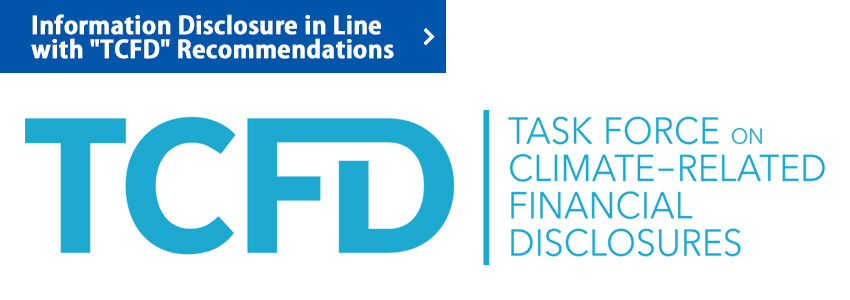Environment
Environmental Management
- Policy and Basic Approach
- Managament Framework
Nextage recognizes that appropriate responses to the environmental issues are the most critical issue for a sustainable business model.
Ensuring our growth and corporate value, it is essential to functionate our corporate governance framework thereby considerate supervision and audit will be applied to an efficient deliverable for the environmental issues.
Risk Management Committee, comprised by directors and chaired by one of the outside directors, basically meets at least once a quarter year.
In the Committee, they review the status of responses to environmental risks and opportunities, formulate response measures, verify the content of such measures, and report to the Board of Directors.
The Board of Directors, as the highest decision-making body, will deliberate and make resolutions on the suggestion of the Risk Management Committee, and supervise the execution of the committee's decisions to ensure the sustainability of management and the resilience of the business.
Additionally, our President and Representative Director has the responsibility to deliberate and decide of environmental issues as being the chairperson of the board of Directors as well as the chairperson of the Risk Management Committee.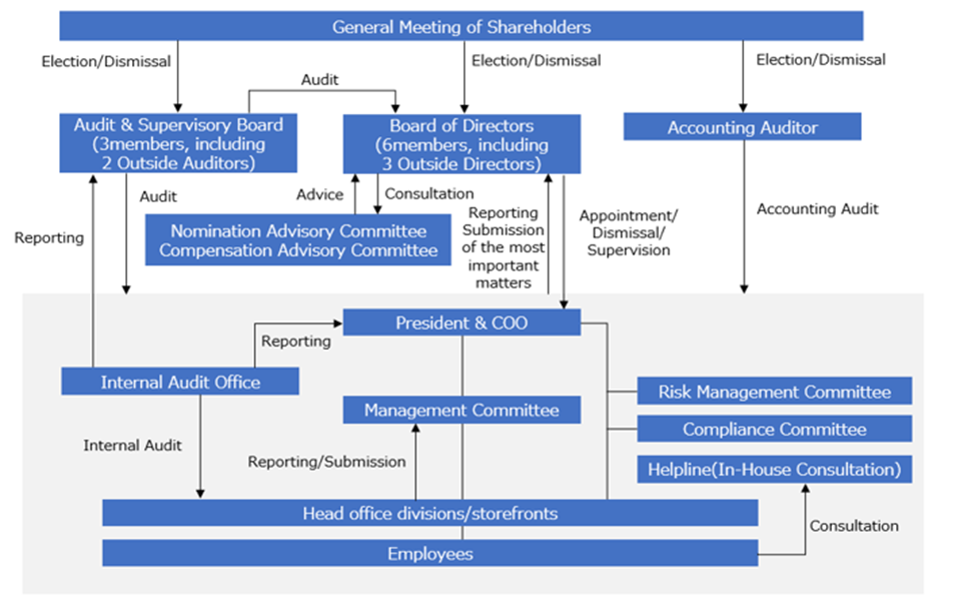
- Risk Management
We ensure risk management at the Board of Directors and the Executive Committee, and in principle, the Risk Management Committee basically meets at least once a quarter year.
The Risk Management Committee is responsible for deepening common understanding of risks, identifying, and examining risks, and determining countermeasures.
In addition, to strengthen the risk management system, the committee formulates business plans, controls budgets, and conducts business operations based on various regulations including the Risk Management Regulations and the Code of Conduct. Furthermore, we are working to enhance internal controls by strengthening our internal audit system.
The Risk Management Committee, in accordance with the risk management process shown in the diagram below, examines in detail the selection, management, and evaluation of risks while integrating climate change-related risks with company-wide risk management. In this way important risks and opportunities for management are identified, countermeasures are determined, and a final report is made to the Board of Directors.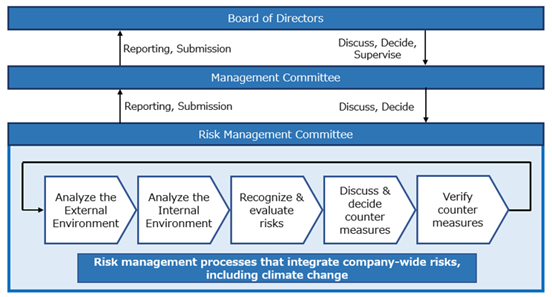
- Important KPI
We have adopted CO2 emissions per net sales (Scope 1 and 2) as an indicator for managing eco-efficiency, and will promote systematic reductions.
Fiscal 2022 result:0.0412(t-CO2 / net sales(millions of yen))
Fiscal 2023 result:0.0475(t-CO2 / net sales(millions of yen))
Fiscal 2024 result:0.0477(t-CO2 / net sales(millions of yen))
Key Environmental Issues
"Realization of a Decarbonized Society"
Climate Change
- Policy and Basic Approach
We will grasp and reduce how much greenhouse gas emissions we make to mitigate the impact of climate change on the natural environment and economic activities. We will also commit to mitigation and adaption to climate change to contribute to the transition to a decarbonized society as well as reduction of the negative impacts of climate change.
- Nextage -
We will grasp and reduce greenhouse gas emissions being produced by our business. To this extent, the efficient energy usage shall be promoted, for instance, the use of renewable energy sources.- Supply Chains -
We observe greenhouse gas emissions made by our supply chains to be able to collaboratively promote initiatives to reduce greenhouse gas emissions.- Customers -
We believe that we can reduce the total greenhouse gas emissions associated with cars by encouraging regular car maintenance through communication with our customers to extend the period between when cars are manufactured and when they are disposed of. - Disclosure Based on the TCFD
Climate Related Financial Disclosure Based on the TCFD Recommendations
- Initiatives
«Creating stores with consideration for environmental impact»

«Installation of solar panels»
We have installed solar power generation equipment on the roofs of our stores under the PPA (Power Purchase Agreement) model. We will purchase the renewable energy generated at our stores and use it to power our store operations, thereby reducing greenhouse gas emissions.
Installed stores Nextage Toki-Tajimi store
Nextage Gifu Route 21 Bypass Store
Nextage Tsu store
Nextage Matsusaka storeGenerated power Approx. 291,903kWh/Y (2024/11) Reduced CO2 Approx. 128t-CO2/y 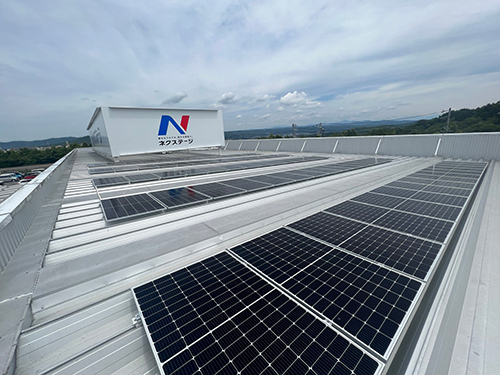
«Expansion of EV handling»
From February 2023, we have newly concluded a dealer agreement with BYD Auto, Chinese EV manufacturer and expanded EV handling.
Also, we are now promoting sales of EV/PHEV cars in our imported car dealership business by which we contribute to the reduction of greenhouse gas emissions from vehicle driving.Records of EV/PHEV sales (volume / order) FY 2023 brand new EV 146 cars, PHEV 69 cars second hand EV 14 cars, PHEV 60 cars FY 2024 brand new EV 222 cars, PHEV 142 cars second hand EV 86 cars, PHEV 82 cars «Promotion of regular vehicle maintenance»
We encourage regular vehicle maintenance through communications with customers.
We believe that proper maintenance extends the time between when cars are manufactured and when they are disposed of, resulting in a reduction in greenhouse gas emissions.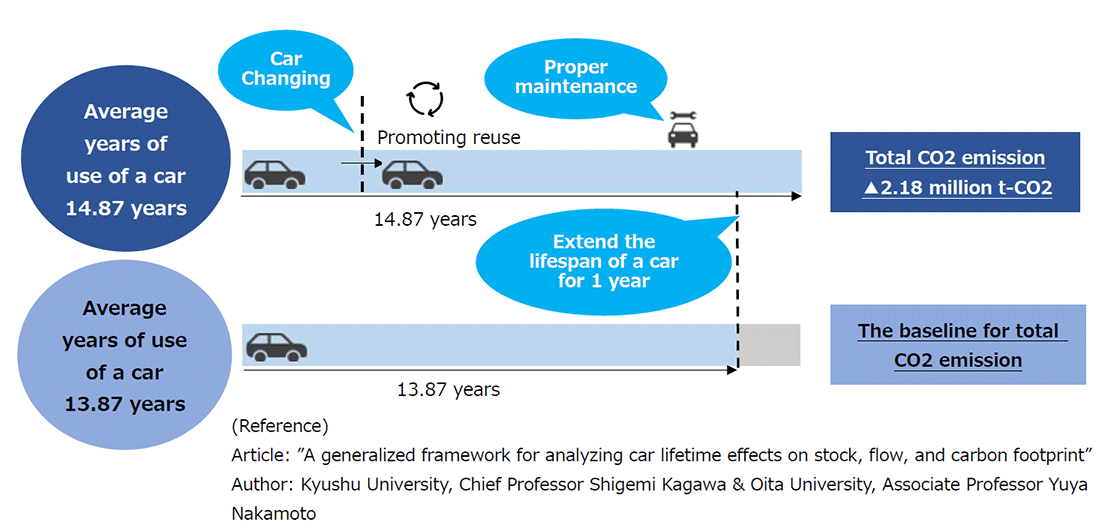
"Contribution to the Circular Economy"
the Circular Economy
- Policy and Basic Approach
We believe that taking balance in our business activities and resource recycling can achieve a sustainable natural environment and economy. We will make effective use of limited resources and strive to reduce our environmental impact.
- Nextage -
Through the used car business (reuse of vehicles and extending their longevity through proper vehicle maintenance) that Nextage is engaged in, we are extending the lifespan of a vehicle from whose manufacture to disposal, thereby contributing to the effective use of resources.- Supply Chains -
Nextage is committing to reducing waste in cooperation with its supply chain by promoting recycling of waste generated by Nextage's business activities through its suppliers.- Customers -
These efforts are promoted by encouraging regular vehicle maintenance extending the lifespan of a vehicle from whose manufacture to disposal through communications with customers. In addition, we will promote reuse and recycling together with our customers by properly handling vehicles that have come into our warehouse for trade-in or purchase from our customers. - Targets
We aim to draw Scope1 and Scope2 down to zero (achieve carbon neutrality) by 2050 with a designated program.
- Initiatives
«Contribution to CO2 reduction through ued car business»
Nexstage's used car business contributes greatly to reducing greenhouse gas emissions, a global issue. Compared to the replacement of new cars, used cars can reduce the total amount of CO2 emissions, a greenhouse gas (see the figure below). By encouraging people to switch to used cars, Nexstage is contributing to the reduction of environmental impact.
CO2 emissions reduction by switching to used cars (comparison of new and used cars)
The figures below show how much CO2 is emitted over a 10-year period when a customer switches cars between a new car and a used car.Source: Calculation of estimated CO2 emissions based on data published in the "Ministry of Economy, Trade and Industry, Agency for Natural Resources and Energy, FY 2017 Research Study on the Petroleum Industry Structure, etc. (Research Report on Energy Supply Structure, etc. in the Automotive Sector in Japan, March 30, 2018).
This calculation was made to visualize the CO2 emissions of the Life-Cycle Assessment of automobiles.
Waste Disposal
- Policy and Basic Approach
We will strive to move away from mass production and mass disposal by effective use of limited resources to shift to sustainable production and consumption behaviors. We will also promote the recycling of waste.
- Nextage -
We are working with our supply chains to recycle and reuse recyclable resources from waste generated through our business activities. In addition, we will contribute to resource conservation by actively introducing products that use recycled materials.- Supply Chains -
Nextage is committing to reducing waste in cooperation with supply chains by promoting recycling of waste generated by Nextage's business activities through our business partners.- Customers -
Through communication with our customers, we encourage regular vehicle maintenance and extend the lifespan of a vehicle from whose manufacture to disposal. In addition, we will promote reuse and recycling together with our customers by properly handling vehicles as trade-in or purchase from our customers. - Initiatives
«Waste recycling in collaboration with the supply chains»
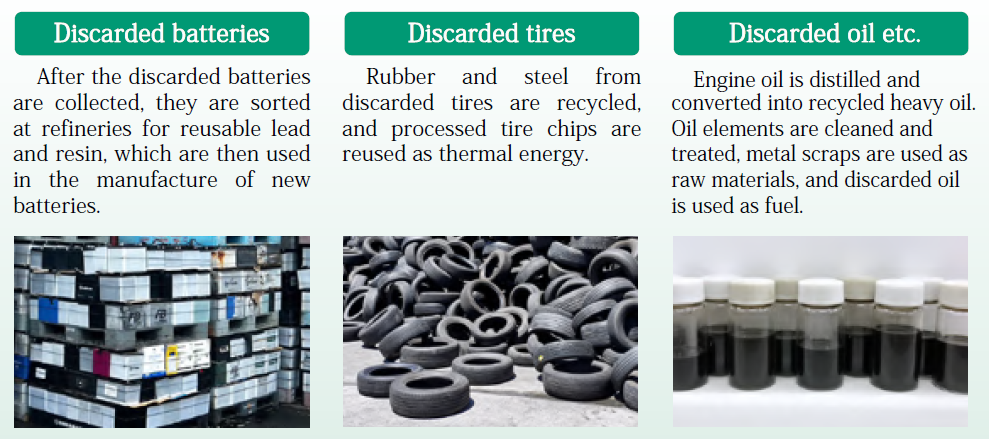
"Coexistence with Nature"
Forests Protection
- Policy and Basic Approach
In order to protect forests, which are important resources in the preservation of ecosystems and economic activities, we strive to prevent deforestation and utilize environmentally friendly timber.
- Nextage -
We are subjected to avoidance of deforestation likewise contribute to conservation of natural resources of the earth thorough our business activities. This includes the introduction of building materials which do not lead to deforestation.- Supply Chains -
We will assess the impact of our supply chain on forests and work together to promote initiatives to reduce the impact on forests.- Customers -
We have digitalized purchase contracts and insurance policies. We make our contribution to forest protection by this reduction of paper consumption. We will also seek to protect forests through communication with our customers. - Initiatives
«Procurement of construction materials»
Building materials for Nexstage stores do not use wood, which leads to deforestation.
«Reduction of paper use»
We are working to reduce paper consumption by digitizing various procedures and contract documents that used to be done on paper and by introducing digital price boards.
① Electronic sales and purchase contracts
② Paperless procedures for automobile insurance
③ Web-based automobile insurance policies
④ Introduction of digital price boards
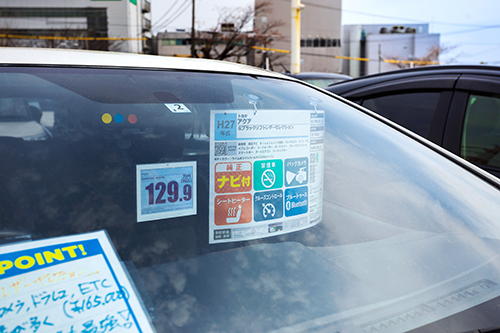
Water Resources
- Policy and Basic Approach
We strive to conserve water resources, which are essential for ecosystems and economic activities, by reducing consumption as well as promoting efficient use.
- Nextage -
We observe the amount of water used throughout our business activities. Based on this information, we will promote efficient use of water resources by, for example, installing water-saving devices to reduce water consumption.- Supply Chains -
We will observe the amount of water resources used by our supply chains to collaboratively promote initiatives aiming to reduce our impact on the natural environment.- Customers -
We will seek to protect water resources through communication with our customers. - Initiatives
«Installation of water-saving devices»
We have started installing of water-saving devices since August 2022.
We are working to reduce the amount of water used mainly when washing vehicles.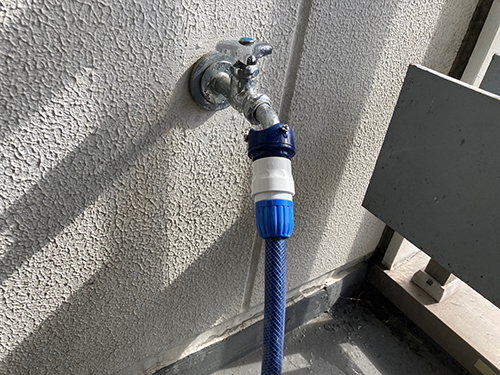
«Promotion of car coatings»
Through communication with our customers, we promote the application of car coatings. We believe that this will help keep cars in a cleaner condition and reduce the time spent washing cars, We believe that this will help keep cars cleaner and reduce the time required to wash them. As a result, we are reducing the amount of water used.

Biodiversity
- Policy and Basic Approach
As part of our corporate social responsibility, we are projected to the protection of promoting actions to conserve biodiversity for the reduction of burden on the environment.
- Nextage -
We recognize the possibility of our business activities impacting on the ecosystem, thus, we put effort on protecting them by, for instance, considering the ecological influence when deciding the area of potential store locations.- Supply Chains -
We will understand the impact of our supply chains on biodiversity and work together to promote initiatives aiming to reduce the burden on ecosystems.- Customers -
We will seek to protect ecosystems through communication with our customers.



